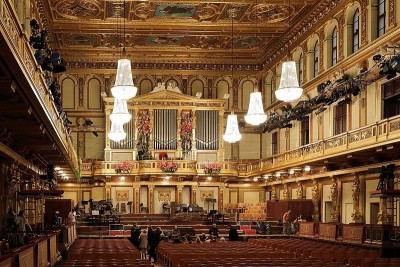Međimurska Popevka Conquers Vienna: Historic Concert in the Golden Hall of the Musikverein
A touch of Croatian tradition and deeply felt emotions filled the venerable Golden Hall of the Vienna Musikverein, one of the world's most prestigious concert halls. The traditional vocal form of Međimurska popevka celebrated its triumphant debut under the title “A Tribute to Međimurska Popevka” (Počast međimurskoj popevki), marking a cultural milestone for the Međimurje region and Croatia as a whole.
 As the sounds of Međimurje, kak si lepo zeleno, echoed through the Golden Hall, it was clear: the small Croatian region had captured the heart of Europe for an unforgettable evening. / Picture: © Wikimedia Commons / Bwag / CC BY-SA 4.0 (https://creativecommons.org/licenses/by-sa/4.0)
As the sounds of Međimurje, kak si lepo zeleno, echoed through the Golden Hall, it was clear: the small Croatian region had captured the heart of Europe for an unforgettable evening. / Picture: © Wikimedia Commons / Bwag / CC BY-SA 4.0 (https://creativecommons.org/licenses/by-sa/4.0)
In front of over 1,600 guests from Austria and Croatia, a spectacular musical event unfolded, celebrated as a “historic moment” for Croatian culture on the international stage.
A stellar cast and emotional performance
The centerpiece of the evening was the renowned soprano Marija Vidović, who hails from Donja Dubrava (Međimurje) and has made Vienna her home. Together with the Dubrovnik Symphony Orchestra conducted by Maestro Ivan Hut, Vidović presented contemporary arrangements of traditional songs from Međimurje, musically connecting northern and southern Croatia. Legendary guitarist Vlatko Stefanovski also made a distinctive mark with his performance.
The evening opened with the overture to Strauss' operetta Die Fledermaus (in honor of the composer's 200th birthday), followed by moving interpretations of popular popevke such as Mura, Mura, Međimurje, kak si lepo zeleno, and Ljubav se ne trži.
Marija Vidović was deeply moved: “It was a night full of emotion and gratitude. Presenting Croatian culture and Međimurska popevka in the city where I studied and which I now call home is an invaluable honor."
More than just a song – cultural heritage
Međimurska popevka has been recognized by UNESCO as Intangible Cultural Heritage of Humanity since 2018. Characteristic of this traditional singing style is the use of the pentatonic scale, which distinguishes it from the usual heptatonic scale. The songs are about love, a sense of home, and traditional customs, and are interpreted with great emotion. The oldest surviving texts date back to the 16th century.
Before the concert, another event on Međimurska popevka took place in Vienna: Dr. sc. Lidija Bajuk, an ethno-artist and researcher from the Institute of Ethnology and Folklore Studies in Zagreb, gave a bilingual lecture and workshop on the spiritual significance of popevka, its motifs such as fairy creatures and the female principle of life, at the Croatian Center in Vienna on November 7. Bajuk, who, like Vidović, comes from Međimurje, received the UNESCO Charter for the Protection of Popevka.
Dignitaries and plans
Among the prominent guests were the governor of Međimurje County, Matija Posavec, Croatian national soccer coach Zlatko Dalić, the president of the Croatian Olympic Committee, Zlatko Mateša, as well as diplomats and local dignitaries.
“Bringing popevka to the Musikverein opens new doors for cultural cooperation and the promotion of our heritage throughout Europe. Međimurska popevka is more than just a song; it is part of our identity that connects people,” emphasized County Governor Posavec. The concert in Vienna marks the start of a world tour. At the same time, an important future project was announced: the opening of the Museum of Međimurska Popevka (Muzej međimurske popevke) in Međimurje in early 2026. This museum will serve as a permanent center for the preservation and presentation of this tradition, which has grown over centuries.



